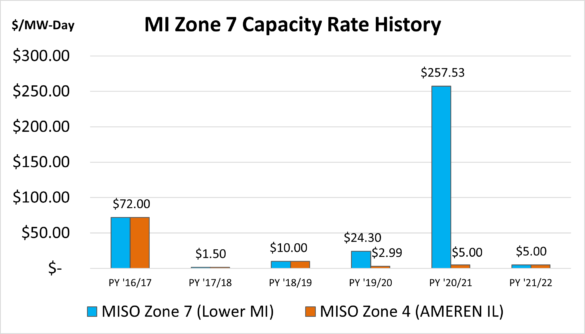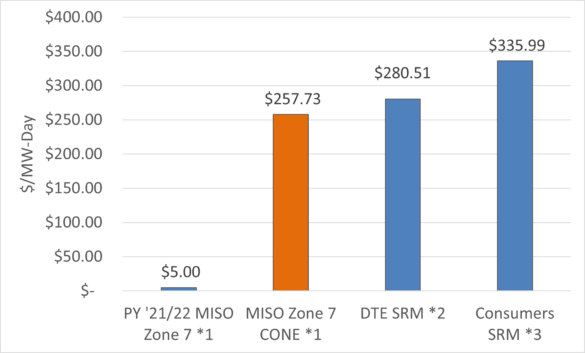Michigan Market: Electricity Capacity and its Impact on Customer Budgets
3 min readElectrical capacity is the component on electricity bills that makes sure there’s enough generation resources to serve the power grid on the peak hottest days of the year. Generation resources refers to the mix of energy sources – coal, solar, natural gas, wind, nuclear and other fuels – that are used in this region to supply energy for buildings and companies to keep their lights on, HVAC working, computers running, factories and plants up and running.
Since generation assets to meet these peak obligations cannot be developed very quickly, MISO (Midcontinent Independent System Operator) and the state of Michigan plan several years in advance to meet these high grid usage time periods.
In addition to managing the power grid within the region, MISO also manages the buying and selling of electricity to make sure there’s enough energy for future needs.
In order to ensure there is enough capacity available to meet Michigan’s state-specific demands, the Michigan Public Act 341 was put in place above and beyond the annual MISO auctions.
What happened at last year’s MISO auction?
Each year, MISO holds a Planning Resource Auction (PRA), which show the available capacity for the planning year which runs June current year to May following year (e.g. the 2021 auction is effective for June 2021 – May 2022 capacity). In 2020, Zone 7 (the Lower Peninsula of Michigan) cleared at $257.53/MW-day, a threshold called the Cost of New Entry (CONE), which was roughly 10 times the prior auctions’ clearing price (see: 2020-2021 MISO PRA Auction Result). The CONE is used to indicate the current, annualized capital cost, of constructing a power plant and is substantial to incentivize the building of new assets to meet a potential Capacity shortfall.
If an AES (alternative electric supplier) like Constellation is not able to demonstrate that it has enough capacity to serve their customers on a 4-year rolling basis, then the supplier is responsible for purchasing capacity at the rate established by the State Reliability Mechanism (SRM) outlined in the bill in order to incentivize the build out of new Capacity assets (similar to CONE mentioned above). The SRM rate, shown in the graph below, is also substantially higher than the Zone 7 MISO capacity auctions rate for any year except ‘20/21 – with an increase of roughly 40x prior to the 2021 auction, to incentivize the building of new Capacity generation assets.

How can I avoid budget surprises from the annual MISO auction or the future State Reliability Mechanism (SRM) filings?
One of the ways customers can avoid substantial increases in their forward capacity rates is to fix capacity rates for future years. Constellation is able to offer fixed capacity by utilizing our wholesale team to procure the capacity rate from the bilateral market to meet a customers’ capacity requirement. Doing so allows customers to have budget certainty for their capacity rate.
Why does my energy supplier reach out every year for a capacity commitment for 4 years from now?
Michigan’s Public Act 341 also requires alternative electric suppliers (AES) like Constellation who supply power to retail customers to demonstrate that they have sufficient capacity in place to meet their capacity obligation for a four-year rolling basis.
In February 2018, Constellation successfully filed to extend the four-year rolling capacity demonstration by an additional year. The current 4-year capacity time period required for suppliers is June 2021 – May 2025.
In February 2022, Constellation filed for the June 2025-May 2026 reporting period.

What’s next for 2023?
Constellation has successfully moved forward with the filing for capacity obligation that took place February 8th, 2022, for the June 2025-May 2026 reporting period.
Later in 2022, several months in advance of the 2023 filing, Constellation will contact customers to provide information on the capacity market and will craft a strategy for customer’s considerations to reduce their budget risk for the February 2023 filing.
We can assist customers by providing automated price-tracking around capacity using our MarketWatch tool, which allows customers to see weekly what their rate for their specific facility would be.
Constellation is also active in Lansing, monitoring Michigan energy policy to provide input on energy matters. We will keep both our customers and channel partners informed if there are any Michigan policy changes that could affect customers’ energy bills.
If you’d like to stay informed about what’s happening in Michigan specific to your facility, please contact your Constellation representative for an update.

